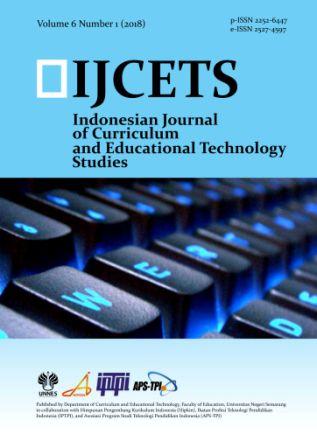Abstract
This article identifying the Indonesi’s 2013 curriculum policy from several types of curriculum development models such as Tyler, Taba, Wheeler, Nicholls & Nicholls, Tanner & Tanner, Stenhause, Cornbleth and Doll. By analyzing carefully the ofcial curriculum policy the author conclude that the 2013 curriculum could be classifed as a “new†type of curriculum which is more eclectic by following the idea curriculum as praxis. The eclectic mode of the curriculum could be trace from its orientation to accommodate lots of idea from various curriculum development models from Tyler to Doll, for instance 2013 curriculum still has a tendency to control the standard of the learning outcome, content and process, but in other hand this curriculum encourages to develop a more contextual curriculum design for all of the schools throughout Indonesia. The 2013 curriculum also makes a compromise between outcome/competency-based and process-based curriculum design in which sometimes make the assessment process become a little bit difcult for the teachers at schools.
Abstrak
Artikel ini mengkaji Kurikulum 2013 dari berbagai jenis model-model pengembangan kurikulum, seperti model Tyler, Taba, Wheeler, Nicholls & Nicholls, Tanner & Tanner, Stenhause, Cornbleth, dan Doll. Dengan mengkaji secara teliti dokumen-dokumen resmi kebijakan Kurikulum 2013 penulis menyimpulkan bahwa Kurikulum 2013 dapat dikategorisasikan sebagai bertipe “baru†yang lebih bersifat eklektik dengan mengikuti gagasan kurikulum sebagai praksis. Kecenderungan eklektik dari kurikulum ini dapat dilihat dari orientasinya yang mencoba untuk mengakmodasi banyak gagasan dari beberapa model pengembangan kurikulum dari Tyler hingga Doll. Misalnya, Kurikulum 2013 masih menggunakan perspektif standardisasi sebagai mekanisme control terhadap mutu lulusan, muatan kurikulum, dan proses pembelajaran, tapi di sisi lain Kurikulum 2013 juga mengarahkan sekolah-sekolah untuk mengembangkan kurikulum yang sifatnya kontekstual. Kurikulum 2013 juga mengkompromikan antara desain kurikulum berbasis luaran/kompetensi dan berbasis proses yang terkadang justru menyulitkan para guru dalam melakukan penilaian hasil belajar siswa di sekolah.
Keywords: Contextual curriculum; curriculum as praxis; curriculum development; eclectic model; the Indonesia’s 2013 national curriculum
